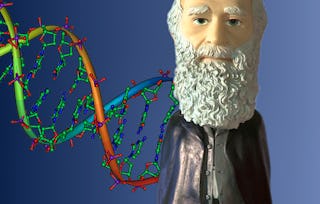In the previous course in the Specialization, we learned how to compare genes, proteins, and genomes. One way we can use these methods is in order to construct a "Tree of Life" showing how a large collection of related organisms have evolved over time.

Molecular Evolution (Bioinformatics IV)
Seize the savings! Get 40% off 3 months of Coursera Plus and full access to thousands of courses.

Molecular Evolution (Bioinformatics IV)
This course is part of Bioinformatics Specialization


Instructors: Pavel Pevzner
18,098 already enrolled
Included with
79 reviews
Skills you'll gain
Details to know

Add to your LinkedIn profile
See how employees at top companies are mastering in-demand skills

Build your subject-matter expertise
- Learn new concepts from industry experts
- Gain a foundational understanding of a subject or tool
- Develop job-relevant skills with hands-on projects
- Earn a shareable career certificate

There are 6 modules in this course
<p>Welcome to our class!</p><p>In this class, we will consider the following two central biological questions (the computational approaches needed to solve them are shown in parentheses):</p><ol><li>Weeks 1-3: Which Animal Gave Us SARS? (<i>Evolutionary tree construction</i>)</li><li>Weeks 4-5: Was <em>T. rex</em> Just a Big Chicken? (<em>Combinatorial Algorithms</em>)</li></ol><p>In Week 6, you will complete a Bioinformatics Application Challenge to apply evolutionary tree construction algorithms in order to determine the origin of the recent ebola outbreak in Africa.</p><p>As in previous courses, each of these two chapters is accompanied by a Bioinformatics Cartoon created by talented artist Randall Christopher and serving as a chapter header in the Specialization's bestselling <a href="http://bioinformaticsalgorithms.com" target="_blank">print companion</a>. You can find the first chapter's cartoon at the bottom of this message. What do stick bugs and bats have to do with deadly viruses? And how can bioinformatics be used to stop these viruses in their tracks? Start learning today and find out!</p><p><img src="http://bioinformaticsalgorithms.com/images/cover/evolution_cropped.jpg" title="Image: http://bioinformaticsalgorithms.com/images/cover/evolution_cropped.jpg" width="528"></p>
What's included
5 videos2 readings1 assignment2 app items
<p>Welcome to Week 2 of class!</p> <p>Last week, we started to see how evolutionary trees can be constructed from distance matrices. This week, we will encounter additional algorithms for this purpose, including the neighbor-joining algorithm, which has become one of the top-ten most cited papers in all of science since its introduction three decades ago.</p>
What's included
3 videos1 reading1 assignment2 app items
<p>Welcome to week 3 of class!</p> <p>Over the last two weeks, we have seen several different algorithms for constructing evolutionary trees from distance matrices.</p> <p>This week, we will conclude the current chapter by considering what happens if we use properties called "characters" instead of distances. We will also see how to infer the ancestral states of organisms in an evolutionary tree, and consider whether it is possible to define an efficient algorithm for this task.</p>
What's included
4 videos1 reading1 assignment2 app items
<p>Welcome to week 4 of the class!</p> <p>Did birds evolve from dinosaurs? Over the next two weeks, we will see how we could analyze molecular evidence in support of this theory. You can find this week's Bioinformatics Cartoon from Randall Christopher at the bottom of this E-mail. Why does the <em>T. rex </em>look so much like a chicken? And why is the monkey typing frantically? Keep learning to find out!</p> <p><img src="http://bioinformaticsalgorithms.com/images/cover/proteomics_cropped.jpg" title="Image: http://bioinformaticsalgorithms.com/images/cover/proteomics_cropped.jpg" width="528"></p>
What's included
4 videos1 assignment2 app items
<p>Welcome to week 5 of class!</p> <p>Last week, we asked whether it is possible for dinosaur peptides to survive locked inside of a fossil for 65 million years. This week, we will see what this question has to do with statistics; in the process, we will see how a monkey typing out symbols on a typewriter can be used to address it.</p>
What's included
5 videos1 assignment2 app items
<p>Welcome to the sixth and final week of the course!</p> <p>In this week's Bioinformatics Application Challenge, we will use reconstruct an evolutionary tree of ebolaviruses and use it to determine the origin of the pathogen that caused the recent outbreak in Africa.</p>
What's included
1 peer review
Earn a career certificate
Add this credential to your LinkedIn profile, resume, or CV. Share it on social media and in your performance review.
Instructors


Offered by
Explore more from Health Informatics
 Status: Free Trial
Status: Free TrialUniversity of California San Diego
 Status: Free Trial
Status: Free TrialUniversity of California San Diego
 Status: Free Trial
Status: Free TrialUniversity of Toronto
 Status: Preview
Status: PreviewDuke University
Why people choose Coursera for their career

Felipe M.

Jennifer J.

Larry W.

Chaitanya A.
Learner reviews
- 5 stars
69.62%
- 4 stars
17.72%
- 3 stars
8.86%
- 2 stars
0%
- 1 star
3.79%
Showing 3 of 79
Reviewed on Dec 4, 2016
At some point several instructors lost necessary passion to keep us focused. Otherwise it was a very informed and enjoyable presentation. Historical references are extremely important.
Reviewed on Jul 20, 2019
In depth and comprehensive coverage of the topics in genetic data analysis.
Reviewed on Jul 19, 2017
Covers the most important algorithms for phylogenetic trees. Fascinating exam

Open new doors with Coursera Plus
Unlimited access to 10,000+ world-class courses, hands-on projects, and job-ready certificate programs - all included in your subscription
Advance your career with an online degree
Earn a degree from world-class universities - 100% online
Join over 3,400 global companies that choose Coursera for Business
Upskill your employees to excel in the digital economy
Frequently asked questions
To access the course materials, assignments and to earn a Certificate, you will need to purchase the Certificate experience when you enroll in a course. You can try a Free Trial instead, or apply for Financial Aid. The course may offer 'Full Course, No Certificate' instead. This option lets you see all course materials, submit required assessments, and get a final grade. This also means that you will not be able to purchase a Certificate experience.
When you enroll in the course, you get access to all of the courses in the Specialization, and you earn a certificate when you complete the work. Your electronic Certificate will be added to your Accomplishments page - from there, you can print your Certificate or add it to your LinkedIn profile.
Yes. In select learning programs, you can apply for financial aid or a scholarship if you can’t afford the enrollment fee. If fin aid or scholarship is available for your learning program selection, you’ll find a link to apply on the description page.
More questions
Financial aid available,
¹ Some assignments in this course are AI-graded. For these assignments, your data will be used in accordance with Coursera's Privacy Notice.

